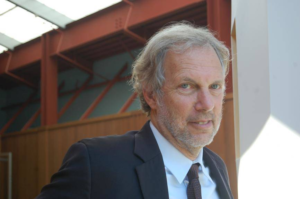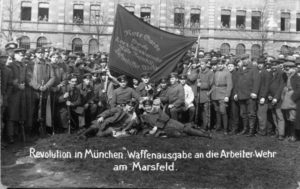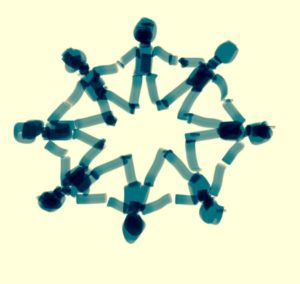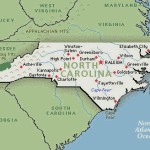Chomsky And Pollin: A Global Green New Deal Is The Only Way To Avert Disaster
Global warming is the biggest challenge facing humanity today. Yet, climate change has yet to become our number one priority even though, as the World Meteorological Organization warned back in March 2020, “time is fast running out” on averting an acute environmental catastrophe.
In this context, a comprehensive Green New Deal is urgently needed to be put into action. A Global Green New Deal. And, hopefully, the incoming Biden administration will not squander the opportunity to have the U.S. take the lead on climate emergency now that the Senate is under Democratic control.
In the interview that follows, Noam Chomsky and Robert Pollin explain the urgency of undertaking ambitious efforts to respond globally to the existential crisis of climate change within the context of a just transition to a green economy. Chomsky and Pollin are joint recipients of the 2020 Climate Courage Award granted by the Climate Change Leadership Institute for their book Climate Crisis and the Global Green New Deal and its articulation of “a global solution that is not only bold and viable but also replete with the need for a just transition.”
C.J. Polychroniou: Noam, the outgoing Trump administration was the worst thing that could have happened for the environment. Trump rolled out dozens of deregulation policies. His administration reversed the Obama-rule on methane emissions, even though methane, the natural ingredient in natural gas, is 84 times more potent than carbon dioxide. Meanwhile he denied the science of climate change and withdrew the United States from the Paris climate agreement. What can we expect from the Biden administration on climate emergency, especially now that the Senate is under Democratic control, and why is it so important that the U.S. should rejoin the Paris Agreement?
Noam Chomsky: Rejoining the Paris Agreement is imperative, but only a bare beginning. The Agreement was an important step forward. It is, however, very weak, not even close to what has to be done. It also has no teeth: it is voluntary, no binding commitments. The primary reason for the weakness is the U.S. Republican Party, which would not permit anything that went much beyond symbolism. The Party is still there. In fact, it just achieved overwhelming success in the November 2020 elections, winning at every level except for the White House, where distaste for Trump’s antics prevailed. That victory is quite astonishing if only in light of the fact that the Party’s leaders were responsible for killing tens if not hundreds of thousands of Americans in the preceding months — not to speak of racing to the abyss of environmental catastrophe, a fact that scarcely registered.
The Party is still there, a dominating force, poised to ensure that the country is ungovernable, a specialty of Senate Republican leader Mitch McConnell as he proclaimed with pride during the Obama years and demonstrated with considerable success.
And Trump is not gone, far from it. A large majority of the Republican voting base regards him as their leader, if not savior. They can be whipped up to threaten any Republican office holder who dares to depart from Trump-McConnell malevolence, much as the Tea Party was organized and used for that purpose, with plenty of funding from powerful concentrations of capital. It may be recalled that as recently as 2008, during the McCain campaign, Republicans were willing to entertain the thought that there might be some problem about destroying the climate that sustains life. With virtual unanimity, they succumbed to a juggernaut launched by David Koch to extirpate that heresy, a victory that remains in place. With Trump setting himself up as the “true victor” in the elections, stirring up poisons in the ways he masters very well, there will be serious barriers to returning the country to a moderately civilized course.
How serious the barriers are we saw right before our eyes on January 6, a fateful day.
Ever since he gained office, Trump has been working hard to turn the country into a tin-pot dictatorship under his rule, a process we have been discussing regularly in this forum as it has unfolded.
To repeat briefly, there have been three prongs to the assault against the world by this miserable creature:
1. Destroying the environment that sustains life
2. Sharply increasing the threat of terminal nuclear war;
3. Dismantling formal democracy.
The first one alone suffices to establish him as arguably the most dangerous political figure in human history, a truism that has been hard for many to contemplate.
Right now we are witnessing the next step in his dedication to destroy American democracy. He has been bragging for years about the “Tough Guys for Trump” — his Black and Brown Shirts.
On January 6, he unleashed them, encouraging their violence and destruction as they broke into the Capitol Building to prevent formal ratification of his electoral defeat, which, it seems, he will never acknowledge no matter how much destruction is caused by his malevolence.
In his disgraceful performance calling on his tough guys to go home — for now — he could not refrain from stirring up more poisons with brazen lies about how his “landslide victory” was stolen by evil forces, doing what he can to ensure maximum damage to the country to which he intends to return triumphantly to complete the wreckage.
Utopie in de jungle. Zoektocht naar de geheimzinnige B. Traven
In 1922 ontving de Duitse dichter, toneelschrijver en anarchist Erich Mühsam een ansichtkaart uit Rotterdam. De tekst luidde: ‘In ein paar Stunden betrete ich ein Schiff das mich über den Ozean führt, und dann existiere ich nicht mehr’. Het is het laatste levensteken dat ooit vernomen is van de anarchistische auteur Ret Marut, met wie Mühsam had samengewerkt tijdens de kortstondige socialistische Beierse Radenrepubliek in 1919. Ret Marut was op dat moment op de vlucht voor de Duitse autoriteiten. De Beierse Radenepubliek was hardhandig neergeslagen door de sociaaldemocratische troepen van de republiek Weimar. Vanwege zijn rol tijdens de radenrepubliek werd Marut gezocht. Erich Mühsam werd voor zijn deelname aan de opstand later veroordeeld tot vijftien jaar gevangenisstraf. De anarchist Gustav Landauer, die een vooraanstaande rol had gespeeld, werd vermoord. Vlak voordat Ret Marut wegens hoogverraad ter dood zou worden veroordeeld, had hij weten te ontsnappen. Contact met geestverwanten bleek voor hem nauwelijks meer mogelijk. Marut moet toen besloten hebben Europa te verlaten en elders een nieuw leven te beginnen. Zijn anarchistische opvattingen en revolutionaire elan zette hij echter allerminst opzij. Onder het pseudoniem B. Traven publiceerde hij tussen 1925 en 1960 dertien romans en ruim veertig korte verhalen, veelal gesitueerd in Mexico. Der Schatz in der Sierra Madre (1927) is zijn bekendste werk, in 1947 verfilmd door John Huston, met Humphrey Bogart in de hoofdrol.
 Van de schrijver B. Traven waren lang geen biografische gegevens bekend. Tientallen jaren is er gespeculeerd over zijn ware identiteit en gezocht naar het geheim van B. Traven. Zelf hield hij ook het mysterieuze rond zijn persoon in stand, door steeds met nieuwe of gewijzigde verhalen over zijn afkomst te komen.
Van de schrijver B. Traven waren lang geen biografische gegevens bekend. Tientallen jaren is er gespeculeerd over zijn ware identiteit en gezocht naar het geheim van B. Traven. Zelf hield hij ook het mysterieuze rond zijn persoon in stand, door steeds met nieuwe of gewijzigde verhalen over zijn afkomst te komen.
De meeste romans en verhalen van Traven spelen zich af ia Mexico en geven een idealistisch, utopisch beeld van de levenswijze van Mexicaanse indianen. De boeken van B. Traven zijn in tientallen talen vertaald en in miljoenen exemplaren verkocht. In de jaren dertig was hij vooral in Duitsland, maar ook in Nederland, een zeer populair schrijver. Een aantal van zijn romans – Het doodenschip, De witte roos, Regeering, De ossenkar, Mahoniehout en Modesta verschenen in de jaren dertig in Nederland bij De Arbeiderspers.
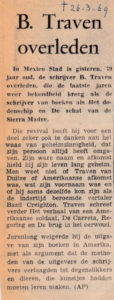 B. Traven overleed op 26 maart 1969 in Mexico Cíty. Zijn weduwe maakte dat een dag later bekend. Zij deelde mee dat na zijn dood bekend mocht worden gemaakt dat B. Traven de voormalige Duitse revolutionair Ret Marut was geweest. Geruchten daarover waren al eerder opgedoken. Maar veel vragen over leven en identiteit van Traven bleven onbeantwoord. B. Traven was inderdaad Ret Marut, een aantal onderzoekers had dat al aangetoond. Maar wie was Ret Marut?
B. Traven overleed op 26 maart 1969 in Mexico Cíty. Zijn weduwe maakte dat een dag later bekend. Zij deelde mee dat na zijn dood bekend mocht worden gemaakt dat B. Traven de voormalige Duitse revolutionair Ret Marut was geweest. Geruchten daarover waren al eerder opgedoken. Maar veel vragen over leven en identiteit van Traven bleven onbeantwoord. B. Traven was inderdaad Ret Marut, een aantal onderzoekers had dat al aangetoond. Maar wie was Ret Marut?
Radenrepubliek
Ret Marut was aanvankelijk toneelspeler. In Duitse toneelgidsen van rond 1910 duikt zijn naam hier en daar op, meestal als acteur van bijrollen. Hij stopte met zijn weinig succesvolle toneelcarrière en ging schrijven. Onder het pseudoniem Richard Maurhut publiceerde hij in 1916 de novelle An das Fräulein von S…, waarvoor zijn vriendin Irene Mermet als uitgever fungeerde. Vanaf 1917 gaf hij in München het eenvoudig vormgegeven anarchistische tijdschriftje Der Ziegelbrenner uit. Het had het formaat en de kleur van een baksteen en was gemodelleerd naar het eenmanstijdschrift Die Fackel van Karl Kraus uit Wenen. Er verschenen veertig nummers – vaak meerdere nummers in een bundeltje – in totaal dertien uitgaven. De latere geheimzinnigheid en terughoudendheid van B. Traven, is in het colofon van Der Ziegelbrenner al te bespeuren. In bijna ieder nummer staat ‘Besuche wolle man unterlassen, er ist nie Jemand anzutreffen. Fernsprecher haben wir nicht.’
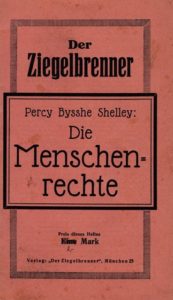
 Marut was uitgever en samensteller van Der Ziegelbrenner en schreef de nummers vrijwel alleen vol. Mogelijk leverde ook zijn beste vriend, de kunstenaar Franz Seiwert enkele bijdragen. In zijn artikelen keerde Marut zich tegen militarisme, kerk en staat. Hij verdedigde de rechten van het individu en hoopte op een wereldrevolutie. In veel artikelen is de invloed te ontdekken van de individueel-anarchist Max Stirner (1806-1856) en diens boek Der Einzige und sein Eigentum. Volgens Stirner moest de mens zich bevrijden van iedere dwang, van staat, van God en de gemeenschap. Wanneer ieder individu voor zichzelf strijdt, komt iedereen tot maximale ontplooiing. Er kon niets boven het individu staan, ook niet het gemeenschappelijke van een communistische samenleving, want ook dan zou het individu immers ondergeschikt zijn, zo stelde Stirner.
Marut was uitgever en samensteller van Der Ziegelbrenner en schreef de nummers vrijwel alleen vol. Mogelijk leverde ook zijn beste vriend, de kunstenaar Franz Seiwert enkele bijdragen. In zijn artikelen keerde Marut zich tegen militarisme, kerk en staat. Hij verdedigde de rechten van het individu en hoopte op een wereldrevolutie. In veel artikelen is de invloed te ontdekken van de individueel-anarchist Max Stirner (1806-1856) en diens boek Der Einzige und sein Eigentum. Volgens Stirner moest de mens zich bevrijden van iedere dwang, van staat, van God en de gemeenschap. Wanneer ieder individu voor zichzelf strijdt, komt iedereen tot maximale ontplooiing. Er kon niets boven het individu staan, ook niet het gemeenschappelijke van een communistische samenleving, want ook dan zou het individu immers ondergeschikt zijn, zo stelde Stirner.
Ook literatuur en poëzie kregen aandacht in Der Ziegelbrenner. Het voorlaatste nummer werd geheel gevuld met het door Marut geschreven sprookje Khundar, wat de neergang beschrijft van de oude vooroorlogse Europese normen en waarden.
Tijdens de Beierse Radenrepubliek bood de Revolutionäre Zentralrat Marut de positie van hoofd van de pers aan, maar hij sloeg dit af. In plaats daarvan kreeg hij de leiding van de censuur op kapitalistische dagbladen. Hij schreef een Socialisierungsplan für die Presse, een ontwerp voor de onteigening van de burgerlijke pers. Net als de door hem bewonderde Karl Kraus had Marut een grondige afkeer van de burgerlijke pers en van journalisten. Wie revolutie wil, moet beginnen met de pers de nek om te draaien, zo herhaalt hij in Der Ziegelbrenner. Immers in handen van of gekneveld door het gevestigde gezag zijn kranten een machtig wapen ter beïnvloeding van de publieke opinie, en journalisten zijn handlangers daarvan.
In de tumultueuze chaos van het gewelddadige einde van de Beierse Radenrepubliek werd Marut gearresteerd en vastgehouden in een politiebureau. Vlak voordat hij door een ad-hoc rechtbank wegens hoogverraad ter dood veroordeeld zou worden, wist hij door onoplettendheid van bewakers op miraculeuze wijze te ontsnappen.
Would A Bobi Wine Presidential Victory Bring Freedom And Prosperity To Uganda?
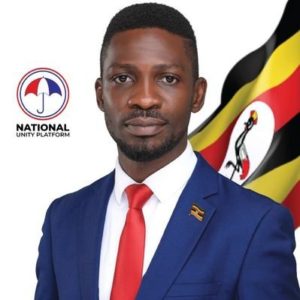 Robert Kyagulanyi Ssentamu—better known to the public as Bobi Wine—is a singer turned politician who is currently campaigning in the January 2021 general election to oust Uganda’s President Yoweri Museveni who has been in power for more than 30 years.
Robert Kyagulanyi Ssentamu—better known to the public as Bobi Wine—is a singer turned politician who is currently campaigning in the January 2021 general election to oust Uganda’s President Yoweri Museveni who has been in power for more than 30 years.
Bobi Wine, with a widespread following and popularity among a significant segment of the Ugandan population, has emerged as a strong challenger to Museveni. As a musician, many of Wine’s songs take a socially conscious tone by speaking out against poverty, and in favor of freedom and democracy for Ugandans. Wine grew up in one of the nation’s poorest neighborhoods in the capital city of Kampala and his rise from poverty to being a successful singer, and then an elected Member of Parliament, has been viewed as an inspiration to many of his followers who regard him as ‘the Ghetto President’.
Since Wine’s election as Member of Parliament in 2017, he strongly opposed authoritarian measures imposed by Museveni such as the President’s decision to remove age limits and Wine publicly rallied against the President’s decision to impose a social media tax to stifle opposition towards him on WhatsApp, Facebook, and Twitter.
During this time, Wine also created a national movement called “People Power”— a movement consisting of, as The Economist describes, “a messy coalition of established politicians, frustrated graduates, and the hustlers of his ghetto hinterland.”
The purpose of the movement is to bring awareness to Museveni’s improper governance and to challenge conventional politics. In response to Wine’s public demonstrations against Museveni, Wine has been subjected to state-sanctioned torture and repeated arrest. Most notably, in August 2018, allegedly on the orders of President Museveni, the Ugandan Security Forces fired live bullets into a crowd of Wine supporters, killed Wine’s personal driver, invaded the hotel that Wine was staying in and proceeded to arrest and subsequently torture him and his colleagues.
On July 24 th , 2019, Wine announced his bid to run for president in the 2021 general election. In July 2020, Wine announced himself as the leader of the rebranded and previously obscure political party, the National Unity Platform (NUP). The formation of such a party, with its conventional structure and authority over candidates, comes in contradiction with the spirit of Wine’s People Power movement aimed at challenging conventional politics. In addition, it has been reported that Wine’s new party has engaged in transactional politics. For instance, Derrick Ssonko, who is a mechanic, felt inspirited to run for local councilor, “but the party ticket went to a rival who paid a bribe. He worries that the NUP is ‘old wine in new bottles’ even though everyone he knows will vote for it.”
During his Presidential campaign, supporters of Wine have been met with police violence. In November, 54 people were killed as supporters called for the release of Wine from detention.
Wine had been arrested at a campaign rally. Uganda’s security forces have routinely prevented Wine from attending his campaign rallies and the President has prevented Wine from appearing on TV and radio stations. Most recently, the United States’ Secretary of State, Mike Pompeo, publicly condemned tactics within Uganda to suppress free and fair elections. In addition, Eliot Engel, the chairperson of the US House Committee on Foreign Affairs, has requested that the US impose sanctions on several Ugandan security officials in response to “a worsening of human rights in the country.” In order to prevent Museveni from rigging the election, Wine has said that he hopes for an overwhelming turnout at the ballot box to make it difficult for Museveni to do so.
Uganda consists of a nation where 80% of the population is under the age of 35, and for these individuals, Bobi Wine brings a great deal of hope for a better life. The disparity in the demographics has created a generational divide whereby Museveni is viewed as unpopular among the youth but is viewed as popular among older rural voters who view regime change as “a hauntingly perilous idea”—linking such change to the years of bloody horror that preceded Museveni.
However, it must be met with cautious optimism whether, as a politician, Wine would be able to deliver on his promises or whether Wine’s victory would mean a continuation of corrupt politics. In Wine’s campaign manifesto he states, “Our promise to the youth of Uganda, we shall ensure we find meaningful employment for you. We want to create at least 5 million jobs. We shall invest in technology and a massive scale of industrialization……A vote for NUP is an assurance that citizens will never be persecuted for disagreeing with the government. A vote for NUP is a vote for the protection of our natural resources as a country which Gen. Museveni now treats as his personal wealth. A vote for NUP is a vote for the closing of the income gap between the rich and the poor…. Our promise to all Ugandans is that we shall safeguard their land. We shall put an end to the enormous scale of land grabbing. If it is done, justice must prevail… The National Unity Platform is committed to working with all Ugandans to improve their lives. We believe that immediately after taking over government, every Ugandan from Kaabong to Kisoro, from Yumbe to Busia will experience meaningful change in their way of life……”
Despite such progressive electoral promises, it remains publicly unclear as to how Bobi Wine proposes to accomplish them. Wine’s political headquarters has images of pan-African heroes like socialist leader Thomas Sankara, but Wine has also been known to collaborate with free-market thinktanks. Wine said that his goal is to rebuild public institutions and end decades of personalized rule, but Wine himself has also said, “I don’t have a very radical programme.” In President Museveni’s first year in office, he published a book entitled, “What’s Africa’s Problem?”—in which he stated, “The problem of Africa, in general, and Uganda in particular, is not the people but leaders who want to overstay in power.” Bobi Wine’s call for freedom, democracy, and prosperity for Ugandans were the same political views that Museveni had once politically embraced long ago, but gradually, with time, Museveni became a corrupt authoritarian leader—if Bobi Wine won, would he be capable of ending the repetition of that authoritarian cycle?
—
Pitasanna Shanmugathas is a second year MGA student. During his undergraduate studies in political science and criminology at the University of Toronto, Pitasanna volunteered with the Canadian Centre for Victims of Torture, primarily providing support to refugees fleeing persecution in their native countries. Pitasanna is the director of a social media group, consisting of over 2,500 members, that speaks out against past and ongoing human rights abuses in Sri Lanka carried out by both state and non-state actors — as director Pitasanna has interviewed Sri Lankan politicians, journalists, and activists to bring greater awareness to the country’s ethnic tensions and human rights abuses. In 2017, Pitasanna launched a petition, which was later introduced in Parliament, calling on the Trudeau government to accept Rohingya refugees into Canada. His career goals include working with organizations to protect the rights of refugees and minority communities and advocating for constitutional reform in nations besieged by conflict.
Green Social Democracy Offers The Most Viable Path Toward A Sustainable Future
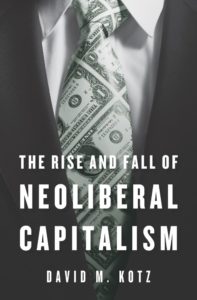 The coronavirus pandemic has created both a public health and an economic crisis in the United States. More than 300,000 people have died of COVID-19, with excess deaths highest among Black and Latinx populations. Hospitals across the country have passed the breaking point. And millions are struggling to eat and pay the rent. Yet, the stock market is hitting record highs and the super-rich are getting even richer in the midst of the pandemic. Yet, there is no talk among the elites of meaningful reforms, even while the climate change is driving the planet to tipping points.
The coronavirus pandemic has created both a public health and an economic crisis in the United States. More than 300,000 people have died of COVID-19, with excess deaths highest among Black and Latinx populations. Hospitals across the country have passed the breaking point. And millions are struggling to eat and pay the rent. Yet, the stock market is hitting record highs and the super-rich are getting even richer in the midst of the pandemic. Yet, there is no talk among the elites of meaningful reforms, even while the climate change is driving the planet to tipping points.
In the interview that follows, David Kotz, economics professor at the University of Massachusetts Amherst, argues that radical change is the only hope for a sustainable future and advocates a blueprint based on the vision of a “green social democracy.” Kotz is the author of scores of articles and books, including The Rise and Fall of Neoliberal Capitalism (Harvard University Press).
C.J. Polychroniou: David, we are again in the midst of yet another capitalist crisis, yet the stock market is at a record high. How could this be when the economy is weakening and so many Americans are struggling?
David Kotz: The performance of the stock market is not a good indicator of the health of the economy. It is driven by expected future profits of corporations and future dividend payouts, which cannot be known with any certainty. At times the stock market is affected by purely speculative factors; that is, the belief that if stock prices have been rising recently then they will continue to rise in the future, which can lead to a self-sustaining upward spiral in stock prices.
On March 1, 2020, just before the pandemic began to shut down the U.S. economy, the ratio of price to corporate earnings for the Standard and Poor’s 500 corporations was 22.80, yet after some nine months of pandemic economic crisis, it had risen to 37.08 on December 11, 2020. While the majority of the population has suffered financially during this period, the rich, who do most of the stock market investing, have been doing fine. Large corporations have been taking actions that boost their stock price, such as buying back their own shares at a historically high rate and making large dividend payouts — actions that do not indicate economic health of the economy. While U.S. corporate profits fell by 20 percent in the second quarter of 2020 compared to six months earlier, dividends fell by only 5 percent.
The United States is the richest country in the world, but its distribution of wealth is more unequal than in any other country in the advanced industrialized world. Why is that?
An unmodified capitalist economy generates a very high degree of inequality of income and wealth, as the owners of companies and other forms of property are able to take most of what is produced by working people. However, inequality can be reduced when workers have strong trade unions through which they can claim a larger share of what they produce. Inequality can also be reduced by several kinds of government interventions, including income maintenance programs, progressive tax systems, minimum wage regulations, provision of essential goods and services for free or at reduced cost, and not least, fiscal and monetary policies that promote a low rate of unemployment. A low unemployment rate increases labor’s bargaining power and particularly benefits workers who are at the low-wage end of the working class.
The labor movement in the U.S. historically has been weaker than in other developed capitalist countries. Among the reasons for this are the following: 1) the ethnic and racial diversity of the U.S. working class, which has made it more difficult for all workers to combine in struggle against employers; 2) the rapid population growth in the U.S. in the period when capitalism was developing in the late 19th and early 20th centuries, which created significant opportunity for workers and their children to rise in the class structure; 3) the U.S. capitalist class put up very determined resistance to labor unions, including the use of violence; and 4) American culture is relatively individualistic, which makes it more difficult for workers to engage in collective action.
For the same reasons cited above, the U.S. is the only developed capitalist country in which a working class-based socialist political party has never achieved major party status. In other countries such parties have played the major role in the enactment of government programs that reduce inequality. In the U.S., the Democratic Party has in some periods played a somewhat similar role, but that party is not a workers’ party but rather represents parts of big business and parts of small business as well as working people. The result has been much weaker government programs that reduce inequality.
Essay Essenties Forensische Expertise. Over het ideaal van een Handboek Forensische Expertise
Inleiding
Met dit essay [1] wil ik een onorthodox voorstel doen tot het vervaardigen van een handboek forensische expertise [2] . Mijn intentie is een echte begrip-verbetering te bewerkstelligen bij alle juridische professionals, bij alle ‘gebruikers van forensische expertise’ in de keten van het strafproces; mijns inziens een tijdloos en zeer nuttig ideaal.
Naar aanleiding van recente zitting-bezoeken aan 24 Nederlandse strafzaken waarin deskundigen een belangrijke rol speelden, is mij – in nagenoeg iedere strafzaak – gebleken dat meer begrip en duidelijker uitleg gewenst is van binnen het Nederlands Forensisch Instituut (NFI) gepraktiseerde natuurwetenschappelijk en technisch laboratoriumonderzoek, dat aan sporen wordt verricht, ten dienste van de waarheidsvinding in het strafrecht.
Dit sporenonderzoek in het kader van het strafproces wordt ook wel criminalistiek genoemd. Criminalistiek is het natuurwetenschappelijk deel van de forensische wetenschappen. Het richt zich op natuurwetenschappelijk onderzoek aan bewijsmateriaal ten behoeve van waarheidsvinding in het strafrecht. En het richt zich op de betekenis van de resultaten van zulk onderzoek voor die waarheidsvinding [3] .
De verklaring van een deskundige ter terechtzitting (art. 339, lid 1 sub 4) en het deskundigenrapport, de ‘schriftelijke bescheiden’ (art. 339, lid 1 sub 5) zijn de twee wettige bewijsmiddelen, die de deskundige regarderen ten aanzien van zijn bijdrage aan het bewijs. Samen met: eigen waarneming van de rechter, verklaringen van de verdachte en verklaringen van een getuige (art. 339, lid 1, sub 1, 2 en 3), zijn dit – limitatief – de vijf wettige bewijsmiddelen, die worden erkend in het Wetboek van Strafvordering.
Ondanks dat er in ons land ook forensische expertise wordt verricht door andere instanties, zoals de Politie, (semi) private instituten, – laboratoria en – personen en universiteiten, wil ik om twee redenen het NFI als mijn uitgangspunt nemen:
1. Anno 2020 wordt het leeuwendeel van gerechtelijke onderzoeken aan sporen in verband met strafbare feiten in Nederland nog immer – op hoog wetenschappelijk niveau – door het NFI verricht; in opdracht van het Openbaar Ministerie tijdens de opsporings- en vervolgingsfase, op verzoek van de rechter-commissaris, de rechter en in voorkomende gevallen ook ten dienste van de verdediging, op verzoek van de advocaat.
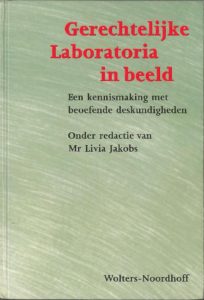
2. Anno 1995 heb ik het voorrecht gehad om een naslagboek [4] te mogen initiëren en redigeren over gepraktiseerde forensische expertise binnen de toen nog ‘’Gerechtelijke Laboratoria’’ genaamde voorgangers van het NFI.
Met betrekking tot de toen door mij onderscheiden 31 diverse deskundigheidsgebieden, is in solide samenwerking met 31 experts, destijds een krachtige kennisbron ontstaan ten dienste van de staande en de zittende magistratuur, wat tevens is aanbevolen als leerboek voor de Politie Academie.
Na 25 jaar acht ik de tijd rijp voor een actuele en gestructureerde herdefiniëring van voorwaarden ter beter begrip van de forensische deskundigheden, in de vorm van een:
Blauwdruk, die de essenties beschrijft van achtergrondkennis, theorie, praktijk en wetenschap, per expertise.
Ter illustratie van de importantie van een systematische samenstelling van een naslag- en leerboek over forensische expertise heb ik de volgende argumenten-vierdeling gemaakt:
A. Waarom: de redengeving, het vinden van redenen,
B. Wat: de inhoudsopgave, het versterken van bètawetenschappen en technieken,
C. Hoe: de methode, het beschrijven van de essentie in de verbindende Blauwdruk,
D. Waartoe: het verbeteren van het begrip van de doelgroepen.
Eutopia Institute of Ideas ~ On Middle East, Diversity & Democracy
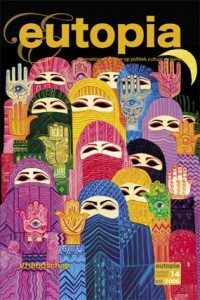 Developing and challenging new ideas on democracy, middle east, religion and transnational citizenship related to art and politics by multi-media works, (e-)print publishing and related e-magazines and by organizing public and professional meetings.
Developing and challenging new ideas on democracy, middle east, religion and transnational citizenship related to art and politics by multi-media works, (e-)print publishing and related e-magazines and by organizing public and professional meetings.
Eutopia concentrates on a variety of political and cultural issues, including the dialog between the Middle East and the West and developments linked to multiculturalism and the Muslim community in the Europe. Its global perspective is crucial.
For its activities Eutopia draws on an extensive network of freelancers, both at home and abroad, including philosophers, scientists, writers, journalists, artists etc. Eutopia’s good reputation is in fact partly based on its extensive network of contributors.
Eutopia is geared in particular – but not exclusively – towards dialog between North and South, as well as between Europe and the Islamic world. In addition, Eutopia aims to foster a concern for identity and intellectual development among young (migrant) individuals and to raise the quality of their input in European debates on social, cultural and political issues.
Eutopia concentrates on three core activities:
Eutopia E- Magazine: an international window on politics, culture and art.
Eutopia Live: lectures and workshops by and with artists and intellectuals; events and discussions about popular culture, film, literature and music.
Eutopia Academy: international exchange, conferences, networking and consultancy for cultural institutions.
Eutopia’s history and objectives
Eutopia, based in Amsterdam, was set up in 2002 by the sociologists Farhad Golyardi and Shervin Nekuee. Both Eutopia Magazine, of which so far twelve issues have appeared, and the Eutopia Live lectures and seminars have meanwhile found a niche of their own in Dutch cultural life. These activities are realized in collaboration with a great variety of local and nationwide institutions, including De Balie, De Unie, University of Amsterdam, Erasmus University Rotterdam, ISIM, Forum, Hivos, and the city of Amsterdam and the city of Rotterdam.
In general, Eutopia pursues closer collaboration with universities, governmental agencies and cultural institutions and foundations. Moreover, in the past few years, Eutopia has set up an extensive international network of scholars, authors, thinkers and artists in diaspora, many of whom are refugees. They provide major contributions to global intercultural dialogs and the formulation of new views about the dynamic of culture, identity and politics.
Eutopia aspires to develop into a more comprehensive interdisciplinary platform or institute that both nationally and internationally stimulates intercultural dialog in the areas of politics, science, culture and art. As such it fully follows in the prominent Dutch cultural tradition of politics and religious tolerance, which has spawned great thinkers such as Spinoza and Erasmus.
Eutopia is committed to promoting the debate on multicultural affairs in the Netherlands from a European and international perspective. What is the position of the Netherlands with respect to other European and immigration countries? Which social or cultural developments elsewhere have particular relevance for the Netherlands as an evolving multicultural society?
Go to: https://eutopiainstitute.org
